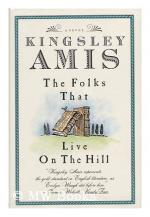|
This section contains 318 words (approx. 2 pages at 300 words per page) |

|
Amis's social comedies are part of an ancient literary tradition. The Ancient Greeks and Romans liked social comedies, and their literature is filled with befuddled businesspeople, conniving slaves, and inept politicians. Social comedy first took a strong place in English literature in the late 1600s, with plays like The Country Wife (1673) by William Wycherley. These comedies are usually focused on high society, and they tend to emphasize the strained sexual relationships between men and women. The novelist Henry Fielding deepened and enriched the social comedy tradition with such books as The History of Tom Jones, a Foundling (1749), which relates the misadventures of a young man in quest of love and self-identity. Perhaps the greatest social comedies were written by Jane Austen. Like The Folks That Live on the Hill, Austen's novel Pride and Prejudice (1813) describes an entire community, although that novel has a stronger plot line...
|
This section contains 318 words (approx. 2 pages at 300 words per page) |

|




